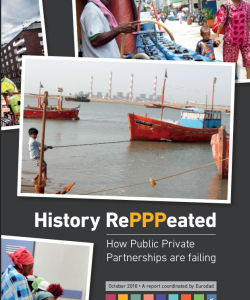
History RePPPeated: How Public Private Partnerships are failing
Although the involvement of the private sector in public service provision is not new, there is currently keen political interest in PPPs as an important way to leverage private finance. Donor governments and financial institutions, such as the World Bank Group (WBG) and other multilateral development banks (MDBs), have set up multiple initiatives to promote changes in national regulatory frameworks to allow for PPPs, as well as to provide advice and finance for PPP projects.
This report gives an in-depth, evidence-based analysis of the impact of 10 PPP projects that have taken place across four continents, in both developed and developing countries. These case studies build on research conducted by civil society experts in recent years and have been written by the people who often work with and around the communities affected by these projects.
The countries included are: Colombia, France, India, Indonesia, Lesotho, Liberia, Peru, Spain and Sweden. The sectors they cover are: education, energy, healthcare, transport, and water and sanitation.
Based on its findings, the report finalizes with recommendations to the World Bank Group, the International Monetary Fund and other public development banks, together with the governments of wealthy countries that play a leading role in these institutions. The recommendations emphasize the need to:
- Halt the aggressive promotion and incentivising of PPPs for social and economic infrastructure financing
- Support countries in finding the best financing method for public services in social and economic infrastructure
- Ensure good and democratic governance is in place before pursuing large-scale infrastructure or service developments
- Ensure that rigorous transparency standards apply
The report was published in 2018 and produced by civil society organisations (CSOs) in countries around the world.
